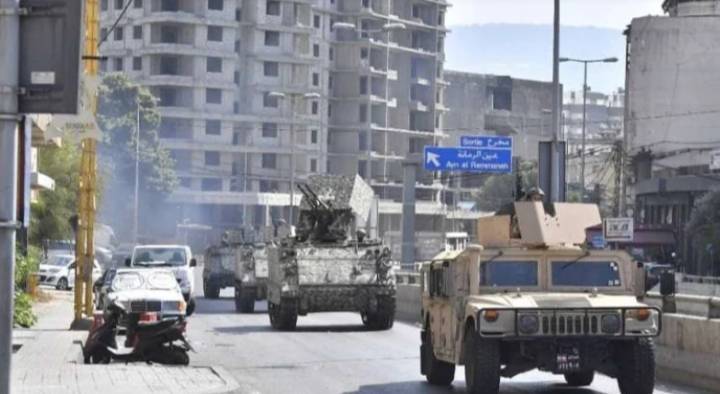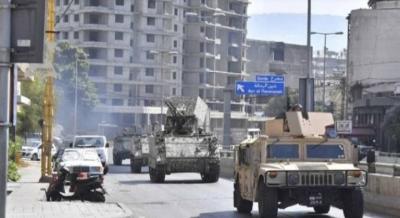"A respite for the warrior." This is how the scene appeared in Lebanon on various "fiery" or "dormant" fronts—in the judiciary, finance, and politics—without anyone being able to grasp the prospects of any of them except that they all lead to... an explosion. There is an increasing impression in Beirut that the stormy week the country experienced, especially with the outbreak of the "judicial war" on the outskirts of the investigation into "Beirutchem," has shaken the judiciary and triggered political "fault lines," as well as the lira reaching "new peaks" in its horrific collapse, forcing everyone to "catch their breath" and attempt to douse as many "fuses" as possible, solidifying the reality that Lebanon is being tossed by "the mouths of volcanoes" fed by an ongoing void in the presidency.
As various sectors, especially land transport, prepare for actions tomorrow in response to the "burning" rise in fuel prices—where the price of a gasoline canister approaches one million and 100,000 lira—and as some schools begin to resort to "Plan B" (such as extending some holidays and considering reducing school attendance days) to cope with the mad trajectory of the dollar and prices impacting transportation costs for teachers and students, as well as lighting, heating, and other operational expenses, fears are growing that any new inflationary "tsunami" might ignite unrest in the "ready" streets. These streets have shown some signals in recent days indicating their readiness for movements that are feared to coincide with the significant popular and political tension that accompanied and followed the outbreak of the battle "For Whom the Bell Tolls" in the "Beirutchem" investigations, which are shifting from one obstruction "trench" to another.
It was not coincidental yesterday that the "threatening atmosphere" accompanied movements, some of which occurred while others were "suggested" to take place, in front of the Palace of Justice, that elicited fears of "blood being spilled." This appeared to be an attempt to curb the atmosphere of solidarity with the families of the victims of the Beirut port explosion, politically supported (by the majority of opposition MPs) and rallying around the investigating judge, Tariq Bitar, who "made a ruling for himself" by resuming his mission away from dozens of pending lawsuits against him. Simultaneously, it sought to establish a kind of "balance of terror" against the features of the counterattack on the Attorney General of Cassation, Judge Ghassan Ouidat, who "filed a similar case" against Bitar and took over his authorities, releasing all detainees in the case.
There was a perception that the investigation into "Beirutchem" had entered a new tunnel and that any halting of the fragmentation of the bomb that exploded within it would require a simultaneous step back from both Bitar and Ouidat (40 opposition MPs demanded accountability) without knowing who might safeguard such an exit that of course needs “complementary” and non-complex mechanisms to alleviate the investigations. Notably, the head of the Lebanese Forces party, Samir Geagea, during his meeting with U.S. Ambassador Dorothy Shea, considered that recent developments require us to provide full support to complete the investigation into the port explosion case by immediately seeking to form an international fact-finding committee to assist in uncovering the truth about this crime and redirecting the path of justice.
The vicinity of the Palace of Justice in Beirut witnessed a movement of dozens of activists demanding the dismissal of Judge Ouidat, amidst counter-calls on social media for a counter-movement in support of the Attorney General of Cassation. This prompted the families of the port victims to issue a statement warning that "there are calls being distributed to gather at 11 in front of the Palace of Justice in Beirut, some of which support Ghassan Ouidat and others which call for his dismissal... We, as families of the victims, want to warn about these calls which aim—to among other objectives—to incite violence and bloodshed in the street," hoping that "everyone remain vigilant and not be led by those trying to drag us into strife, and to follow the calls for movement that emerge exclusively from the families of the victims."
This coincided with intensive measures implemented by the Lebanese army between Ain el-Remmaneh, Tayouneh, and Chiyah, where some entrances were closed with barbed wire to prevent any scenarios reminiscent of what happened in October 2021 during the passage of a march by "Hezbollah" and the "Amal Movement" toward the vicinity of the Palace of Justice to demand the removal of Judge Bitar, where the demonstration diverted towards Ain el-Remmaneh and bloody clashes occurred, bringing the country to the brink of a new civil war.




